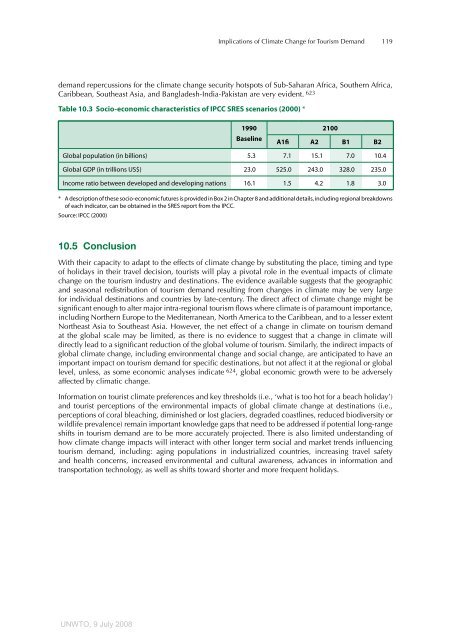Climate Change and Tourism - UNEP - Division of Technology ...
Climate Change and Tourism - UNEP - Division of Technology ...
Climate Change and Tourism - UNEP - Division of Technology ...
Create successful ePaper yourself
Turn your PDF publications into a flip-book with our unique Google optimized e-Paper software.
UNWTO, 9 July 2008<br />
Implications <strong>of</strong> <strong>Climate</strong> <strong>Change</strong> for <strong>Tourism</strong> Dem<strong>and</strong><br />
dem<strong>and</strong> repercussions for the climate change security hotspots <strong>of</strong> Sub-Saharan Africa, Southern Africa,<br />
Caribbean, Southeast Asia, <strong>and</strong> Bangladesh-India-Pakistan are very evident. 623<br />
Table 10.3 Socio-economic characteristics <strong>of</strong> IPCC SRES scenarios (2000) *<br />
1990<br />
Baseline<br />
2100<br />
A1fi A2 B1 B2<br />
Global population (in billions) 5.3 7.1 15.1 7.0 10.4<br />
Global GDP (in trillions US$) 23.0 525.0 243.0 328.0 235.0<br />
Income ratio between developed <strong>and</strong> developing nations 16.1 1.5 4.2 1.8 3.0<br />
* A description <strong>of</strong> these socio-economic futures is provided in Box 2 in Chapter 8 <strong>and</strong> additional details, including regional breakdowns<br />
<strong>of</strong> each indicator, can be obtained in the SRES report from the IPCC.<br />
Source: IPCC (2000)<br />
10.5 Conclusion<br />
With their capacity to adapt to the effects <strong>of</strong> climate change by substituting the place, timing <strong>and</strong> type<br />
<strong>of</strong> holidays in their travel decision, tourists will play a pivotal role in the eventual impacts <strong>of</strong> climate<br />
change on the tourism industry <strong>and</strong> destinations. The evidence available suggests that the geographic<br />
<strong>and</strong> seasonal redistribution <strong>of</strong> tourism dem<strong>and</strong> resulting from changes in climate may be very large<br />
for individual destinations <strong>and</strong> countries by late-century. The direct affect <strong>of</strong> climate change might be<br />
significant enough to alter major intra-regional tourism flows where climate is <strong>of</strong> paramount importance,<br />
including Northern Europe to the Mediterranean, North America to the Caribbean, <strong>and</strong> to a lesser extent<br />
Northeast Asia to Southeast Asia. However, the net effect <strong>of</strong> a change in climate on tourism dem<strong>and</strong><br />
at the global scale may be limited, as there is no evidence to suggest that a change in climate will<br />
directly lead to a significant reduction <strong>of</strong> the global volume <strong>of</strong> tourism. Similarly, the indirect impacts <strong>of</strong><br />
global climate change, including environmental change <strong>and</strong> social change, are anticipated to have an<br />
important impact on tourism dem<strong>and</strong> for specific destinations, but not affect it at the regional or global<br />
level, unless, as some economic analyses indicate 624 , global economic growth were to be adversely<br />
affected by climatic change.<br />
Information on tourist climate preferences <strong>and</strong> key thresholds (i.e., ‘what is too hot for a beach holiday’)<br />
<strong>and</strong> tourist perceptions <strong>of</strong> the environmental impacts <strong>of</strong> global climate change at destinations (i.e.,<br />
perceptions <strong>of</strong> coral bleaching, diminished or lost glaciers, degraded coastlines, reduced biodiversity or<br />
wildlife prevalence) remain important knowledge gaps that need to be addressed if potential long-range<br />
shifts in tourism dem<strong>and</strong> are to be more accurately projected. There is also limited underst<strong>and</strong>ing <strong>of</strong><br />
how climate change impacts will interact with other longer term social <strong>and</strong> market trends influencing<br />
tourism dem<strong>and</strong>, including: aging populations in industrialized countries, increasing travel safety<br />
<strong>and</strong> health concerns, increased environmental <strong>and</strong> cultural awareness, advances in information <strong>and</strong><br />
transportation technology, as well as shifts toward shorter <strong>and</strong> more frequent holidays.<br />
119

















